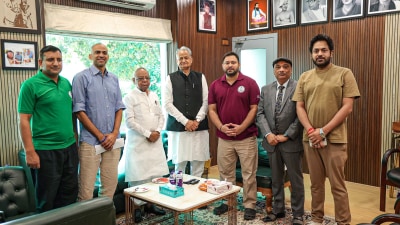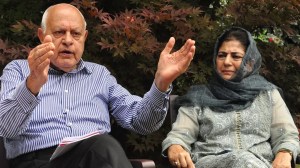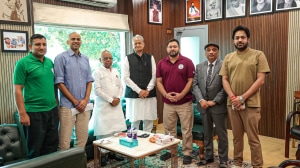Pak spurns Indian no-first-use offer
ISLAMABAD, October 17: Day two of the Indo-Pak talks was a mixed day with Islamabad rejecting New Delhi's no-first-use offer on nuclear w...

ISLAMABAD, October 17: Day two of the Indo-Pak talks was a mixed day with Islamabad rejecting New Delhi’s no-first-use offer on nuclear weapons calling it an “outdated, Cold War concept,” but both countries agreeing to discuss the Jammu and Kashmir issue and “keep on talking.”
Both countries have agreed to continue a “composite” dialogue process on the core issue of Jammu and Kashmir and further negotiations will be held in the forthcoming New Delhi round of talks.
Today, it was Kashmir on the agenda and both sides stated their known positions. India expressed strong reservations against Pakistan’s alleged role in terrorism in the Valley saying that the legal status of the region was beyond question. It also rejected Pakistan’s demand to reduce its forces in the state. Pakistan reiterated its stand that a solution to Kashmir should be in accordance with UN resolutions and suggested posting UN observers to verify India’s allegations regarding terrorism.
“It will be unrealistic on anyone’s partthat we will come out with any concrete outcome…on one of the world’s most complex issues,” said Pakistan Foreign Secretary Shamshad Ahmad, while talking to reporters after today’s talks.
Some observers said there was no progress made today except that both sides agreed to keep the dialogue going on Kashmir. As Indian Foreign Secretary K Raghunath told reporters: “We have agreed that the discussions on this subject of Jammu and Kashmir will be a part of composite dialogue process that we should address.”
Ahmad told reporters that the Kashmir issue was a cause of serious peace and security problem in this part of the world “so nobody should expect that we’ll come out of these three-four sessions with something concrete as an agreement or something that would constitute progress.”
More important, Ahmad said that options for a final settlement of the core issues were discussed during the talks: “Some ideas on how to approach the final settlement of Jammu and Kashmir had come up and of course thisrequires further detailed discussions,” he said.
There was some confusion regarding the dates for the next round with Ahmad saying it would be held in New Delhi from November 5 to November 13 and reports that Raghunath had mentioned January.
To a question, Ragunath said India and Pakistan had stated and restated their respective positions on various subjects and discussed ways to address them. “Of course addressing outstanding issues is one of those,” Raghunath said in reply to a question whether the issue of Jammu and Kashmir was addressed. The joint spokesman for both the countries, Tariq Altaf, earlier, said that the foreign secretaries discussed the agenda item on Jammu and Kashmir. “They reiterated their respective positions and exchanged perceptions on the subject,” said Altaf, also an Additional Secretary with Pakistan’s Ministry of Foreign Affairs.
“The discussions were held in a frank and candid manner and will continue in the next round of Foreign Secretary level talks,” he said. Thefinal round of Islamabad talks will be held on Sunday morning followed by a joint communique.
As for India’s no-first-use offer, Shamshad Ahmad called it “an outdated, Cold War days’ concept.” Soon after the nuclear tests both by India and Pakistan in May, the proposal had surfaced to avoid a possible nuclear showdown between the two South Asian countries. The Indian delegation, as a Confidence Building Measure (CBM), had proposed to enter into an agreement for “no first use of nuclear weapons” against each other. The suggestion was, however, rejected by Pakistan and instead Islamabad offered a non-aggression pact with India that included no use of force, including conventional warfare.





- 01
- 02
- 03
- 04
- 05


























